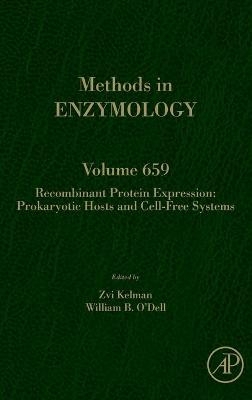
Recombinant Protein Expression: Prokaryotic hosts and cell-free systems
Academic Press Inc (Verlag)
978-0-323-90146-8 (ISBN)
Additional sections cover the Use of native mass spectrometry to guide detergent-based rescue of non-native oligomerization by recombinant proteins, Advancing overexpression and purification of recombinant proteins by pilot optimization through tandem affinity-buffer exchange chromatography online with native mass spectrometry, Method for High-Efficiency Fed-batch cultures of recombinant Escherichia coli, Method to transfer Chinese hamster ovary (CHO) shake flask experiments to the ambr® 250, and Expression of recombinant antibodies in Leishmania tarentolae.
William Brad O'Dell is a PhD biologist experienced in in Molecular Biology, Protein Expression, Protein Purification, Crystallography, Lab-Scale Yeast Fermentation, Flow Cytometry and Small Angle Scattering of Molecules and Materials. Zvi Kelman is the Director of the Biomolecular Labeling Laboratory (BL2), National Institute of Standards and Technology (NIST). He is also an Adjunct Professor in the Department of Cell Biology and Molecular Genetics at the University of Maryland, College Park and affiliated with the Department of Biochemistry and Molecular Biology, University of Maryland School of Medicine. Zvi earned a B.Sc. in Agriculture from the Hebrew University in Jerusalem and a M.Sc. in Cell Biology from the Weizmann Institute of Science. After receiving a Ph.D. in Molecular Biology from Cornell University, he was a Helen Hay Whitney Foundation Post-Doctoral Fellow at Johns Hopkins University and Memorial Sloan-Kettering Cancer Center. Upon completion of his postgraduate training, he became a Life Technologies Professor at the Center for Advanced Research in Biotechnology (CARB), University of Maryland Biotechnology Institute (UMBI). Zvi moved to the University of Maryland, College Park in 2010 as a Professor in the Department of Cell Biology and Molecular Genetics. In 2011 he was recruited to NIST to direct the Biomolecular Labeling Laboratory.
Preface
Bacterial hosts
1. Starting a new recombinant protein production project in Escherichia coli
2. From the notebook to recombinant protein production in Escherichia coli: design of expression vectors and gene cloning
3. Use of tandem affinity–buffer exchange chromatography online with native mass spectrometry for optimizing overexpression and purification of recombinant proteins
4. Purification, reconstitution, and mass analysis of archaeal RNase P, a multi-subunit ribonucleoprotein enzyme
5. Production of antibodies in SHuffle E. coli strains
6. Improved folding of recombinant protein via co-expression of exogenous chaperones
7. Fusing an insoluble protein to GroEL apical domain enhances soluble expression in Escherichia coli
8. Method for high-efficiency fed-batch cultures of recombinant Escherichia coli
9. Fed-batch production of deuterated protein in Escherichia coli for neutron scattering experimentation
Archaeal hosts
10. Thermococcus kodakarensis provides a versatile hyperthermophilic archaeal platform for protein expression
11. Recombinant protein expression in Sulfolobus islandicus
12. High-level synthesis and secretion of laccase, a metalloenzyme biocatalyst, by the halophilic archaeon Haloferax volcanii
13. Tandem affinity purification of 20S proteasomes and other multisubunit complexes in Haloferax volcanii
14. Purification and characterization of ribonucleoprotein effector complexes of Sulfolobus islandicus CRISPR-Cas systems
Cell-free systems
15. Guidelines for nucleic acid template design for optimal cell-free protein synthesis using an E. coli reconstituted system or a lysate-based system
16. Cell-free protein synthesis of CRISPR ribonucleoproteins (RNP)
17. Leishmania tarentolae cell-free based approach for rapid antibody: antigen interaction analysis
18. Cell-free protein synthesis using Chinese hamster ovary cells
| Erscheinungsdatum | 02.11.2021 |
|---|---|
| Reihe/Serie | Methods in Enzymology |
| Verlagsort | Oxford |
| Sprache | englisch |
| Maße | 152 x 229 mm |
| Gewicht | 450 g |
| Themenwelt | Naturwissenschaften ► Biologie ► Biochemie |
| Naturwissenschaften ► Biologie ► Genetik / Molekularbiologie | |
| ISBN-10 | 0-323-90146-8 / 0323901468 |
| ISBN-13 | 978-0-323-90146-8 / 9780323901468 |
| Zustand | Neuware |
| Informationen gemäß Produktsicherheitsverordnung (GPSR) | |
| Haben Sie eine Frage zum Produkt? |
aus dem Bereich


